2011 News Archives
Edward Schwarz, Ph.D., to head The Center for Musculoskeletal Research
Edward M. Schwarz, Ph.D., the Burton Professor of Orthopaedics and Rehabilitation, has been appointed to the additional role of director of URMC's Center for Musculoskeletal Research (CMSR).
Benoit Lab Members Place 2nd and 3rd at Biomaterials Day Conference
Benoit lab members Kanika Vats took 2nd place (her talk titled, Exploiting thiol-ene hydrogels to control cell behavior dynamically) and Michael Baranello took 3rd place (his talk titled,Characterization and Development of Novel Parthenolide Delivery System) at the Syracuse University-University of Rochester sponsored Biomaterials Day: Interactive Biomaterials conference.
Benoit Lab Hosts 4th Graders For a Hands-On Science Experience
What happens when Mrs. Hoffend's fourth grade class visits BME? Well, baking soda-vinegar volcanoes erupt, materials change color, texture, and shape, and Freaky Friday takes on a whole new meaning! The Benoit Lab set up a series of four stations around Goergen Hall and provided the fourth graders with a hands-on science learning experience. Mrs. Hoffend wanted to do a project on scientists in our local area, and learn more about the research that they are involved with. Her students spent several weeks researching, reading, and writing about the Benoit Lab in preparation for the visit.
UR BME Well Represented at BMES Meeting
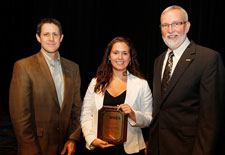 The UR Biomedical Engineering department was well represented at this year's Biomedical Engineering Society Annual Meeting in Hartford, Connecticut. In attendance were 5 faculty members, including Dr. Richard Waugh (BME Department Chair and BMES President), 5 graduate students, 2 staff members, and 24 undergraduate students, who presented posters and spoke about their research.
The UR Biomedical Engineering department was well represented at this year's Biomedical Engineering Society Annual Meeting in Hartford, Connecticut. In attendance were 5 faculty members, including Dr. Richard Waugh (BME Department Chair and BMES President), 5 graduate students, 2 staff members, and 24 undergraduate students, who presented posters and spoke about their research.
Baseball, Hot Dogs, Apple Pie, and BME?
 Most BME seniors spend the summer between their junior and senior years interning in biomedical labs and industries to help decide their next step. This summer, D.J. Schwartz also tried on a possible future for size, but not the usual one. D.J. played on a New York Collegiate Baseball League (NYCBL) summer league team that is affiliated with MLB. This league takes students from all different colleges that are standout baseball players for their college.
Most BME seniors spend the summer between their junior and senior years interning in biomedical labs and industries to help decide their next step. This summer, D.J. Schwartz also tried on a possible future for size, but not the usual one. D.J. played on a New York Collegiate Baseball League (NYCBL) summer league team that is affiliated with MLB. This league takes students from all different colleges that are standout baseball players for their college.
Syracuse University and University of Rochester to Host 2011 Biomaterials Day
On November 18, 2011, Syracuse University and the University of Rochester will hold the first Biomaterials Day Conference to highlight research in the Upstate New York region focused on the development of Interactive Biomaterials that are biocompatible and elicit desired responses when interfaced with biological tissues. The conference is to be held at the Syracuse Biomaterials Institute (SBI) at Syracuse University with a optional Biomaterials Characterization Workshop on November 17th.
Professor Named President of the International Commission for Optics (ICO)
Dr. Duncan Moore, the Rudolf and Hilda Kingslake Professor of Optics and Biomedical Engineering, has been elected president of the International Commission for Optics (ICO). Moore is just the fourth American elected president of the commission, which was formed in 1947. The ICO, originally founded to help rebuild the optics communities in Europe and Japan after WWII, is now focused on providing support for optics and photonics in developing economies.
Dr. James McGrath Receives Coulter Foundation Grant
Professors James McGrath, Ph.D. (Biomedical Engineering) and Jeremy Taylor, M.D.(Nephrology) were recently awarded a Coulter Foundation grant to develop a wearable hemodialysis system using a breakthrough silicon nanomembrane technology originally developed at the University of Rochester. Taking advantage of the extraordinary permeability and selectivity of the nanomembranes, the team hopes to eventually replace clinic-based hemodialysis with a much smaller continuous dialysis system that allows patients to remain mobile. As clinical dialysis requires hours of immobilization during dialysis and fluctuations in toxin levels that cause side effects, a continuous wearable system would provide dramatic improvement in patient lifestyle.
Integrated Nanosystems Center Opens Today
U.S. Rep. Louise Slaughter will join UR President Joel Seligman, Hajim School Dean Rob Clark, and Department of Physics and Astronomy Chair Nicholas Bigelow today for the opening of the Intergrated Nanosystems Center. A news conference is scheduled for 1:30 p.m. in Munnerlyn Atrium, Goergen Hall. The facility brings together the disciplines of physics, optics, chemistry, biomedicine, and bioengineering to enable research in the fields of nanoscience and nanotechnology.
Dr. Regine Choe Awarded NIH Grant to Pursue Development of Cost-Effective Modality to Monitor Ongoing Breast Cancer Therapy
BME assistant professor, Dr. Regine Choe has received a three-year NIH Pathway to Independence Award ($700,000) to investigate an alternative method to positron emission tomography (PET) scans to assess the effectiveness of chemotherapy for breast cancer. Because PET scans are relatively expensive, and since the contrast agent, Flurodeoxyglucose (18F-FDG), contains radioactive compounds, frequent assessment of breast cancer tumors over the course of chemotherapy treatment makes PET scans a less than optimal choice.
BME Seniors Improving Automatic Detection of Epileptic Seizures
A group of BME Seniors led by Professor Laurel Carney has been working together since Fall of their Sophomore year on a research project with the goal of improving automatic detection of epileptic seizures. This debilitating neurologic disorder has an impact on millions of patients, yet there is hope for better treatment through improved detection and someday, prediction, of seizures. The group founded UR DASDA (Database for Automatic Seizure Detection Algorithms), and established a goal of setting up an internet-based database that will provide high-quality electroencephalographic (EEG) recordings for researchers around the world who are developing seizure detection algorithms.
Amy Van Hove Awarded the Howard Hughes Medical Institute Med-into-Grad Fellowship
Amy Van Hove, a graduate student in the Benoit lab has been awarded the Howard Hughes Medical Institute Med-into-Grad Fellowship in Cardiovascular Science. This prestigious Howard Hughes Medical Institute fellowship is sponsored by the Aab Cardiovascular Research Institute (CVRI) and augments traditional Ph.D. training with clinical rotations, a clinical co-mentor, weekly CVRI seminar series, journal club, and translational cardiovascular coursework to train the next generation of bench-to-bedside cardiovascular scientists.
Dr. Danielle Benoit Receives Grant from Leukemia Research Foundation
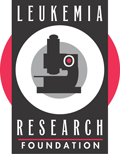 Biomedical Engineering assistant professor, Dr. Danielle Benoit has been awarded a $100,000 grant from the Leukemia Research Foundation (LRF). Dr. Benoit's Therapeutic Biomaterials Lab conducts research on developing new treatments for childhood leukemia by using synthetic hydrogels and polymers formed using reversible-addition fragmentation chain transfer polymerization (RAFT). In 1946, the Leukemia Research Foundation was established in Chicago to memorialize 12-year-old Sherwin Pessin. Since that time nearly 65 years ago, LRF has raised more than $48 million.
Biomedical Engineering assistant professor, Dr. Danielle Benoit has been awarded a $100,000 grant from the Leukemia Research Foundation (LRF). Dr. Benoit's Therapeutic Biomaterials Lab conducts research on developing new treatments for childhood leukemia by using synthetic hydrogels and polymers formed using reversible-addition fragmentation chain transfer polymerization (RAFT). In 1946, the Leukemia Research Foundation was established in Chicago to memorialize 12-year-old Sherwin Pessin. Since that time nearly 65 years ago, LRF has raised more than $48 million.
Benoit Lab Hosts 2nd Annual Alex's Lemonade Stand Fundraiser
Recently Danielle Benoit, Ph.D. received the Young Investigator Award from the Alex's Lemonade Stand Foundation (ALSF) for a grant developing new treatments for childhood leukemia. To give back, Benoit and the Therapeutic Biomaterials Lab held their 2nd annual lemonade stand fundraiser at the Rochester Public Market and the Brighton Farmers' Market over the weekend of June 11. Last year the lab raised $865, and Dr. Benoit had hoped to raise $1,000 this year. But when that goal was meet earlier than expected, Dr. Benoit challenged the lab to higher stakes - raising the goal to $2,000. Urging friends, family, and colleagues to contribute in person and online as well as furnishing over 20 gallons of lemonade at the markets, the lab has raised $2020.53 for ALSF.
UR Research Group Wins Provost Multidisciplinary Research Award
A current study by researchers at the University of Rochester entitled, Perception of Music and Language through Auditory Interference, has been selected as the recipient of the Provost Multidiscipliary Research Award.
Pain-Monitoring Devices for Premature Infants Win Awards in Forbes and Mark Ain Competitions
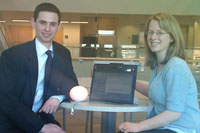 A student team that presented a business plan to commercialize two devices for monitoring pain in premature infants took first place in this year's Forbes Entrepreneurial Competition and third place in the Mark Ain Business Model Competition at the University of Rochester.
A student team that presented a business plan to commercialize two devices for monitoring pain in premature infants took first place in this year's Forbes Entrepreneurial Competition and third place in the Mark Ain Business Model Competition at the University of Rochester.
Student Engineering Team Honored in Three Competitions
People who have had back surgery face the added difficulty of dealing with complicated and burdensome back braces, a process that causes many to bend and twist in ways that are harmful to their recovery. But a group of biomedical engineering students at the University of Rochester is getting recognition for developing back braces that are safer and easier to use, and for their plans to consider commercialization of their devices. As part of a senior design class, Frances Bell, Jacy Krystal Bulaon, and Swapna Kumar, whose project is called DonDoff Solutions, devised a system to help patients get into (don) and out of (doff) their braces throughout the recovery process.
Laurel Carney Awarded Engineering Professor of the Year
Congratulations to Professor Laurel Carney, who was recognized by the Student Association as the Engineering Professor of the Year at the prestigious annual University of Rochester Undergraduate Research Symposium. Undergrad Travis Bevington, BME '12, said, in presenting the award, Even with all of her research, Professor Carney manages to find time to spend countless hours with students on projects and it really proves how much she cares about our success as students. She really serves as an outlet to different opportunities that students might be unaware of, such as finding a lab position or research opportunity. Beyond the classroom, Professor Carney is always in high demand for letters of recommendation—students really feel like she takes the time to get to know all of us, even if her deck of cards in class can be quite intimidating!
(Dr. Carney has a deck of playing cards, with one card for each student. Cards are drawn during class to direct questions to the students.)
Students and Faculty Recognized at the Undergraduate Research Symposium
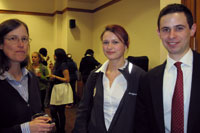 Congratulations to the RCBU and BME students whose work was recognized at the prestigious annual University of Rochester Undergraduate Research Exposition 2011. Undergraduate students from RCBU and BME research laboratories participated in the symposium. BMEundergrads Benjamin Freedman '11 and Kelli Summers '11 were both invited to speak at the Engineering and Applied Sciences Symposium Talks.
Congratulations to the RCBU and BME students whose work was recognized at the prestigious annual University of Rochester Undergraduate Research Exposition 2011. Undergraduate students from RCBU and BME research laboratories participated in the symposium. BMEundergrads Benjamin Freedman '11 and Kelli Summers '11 were both invited to speak at the Engineering and Applied Sciences Symposium Talks.
BME Students Awarded Fellowships for Graduate Research by the National Science Foundation
Three BME seniors received prestigious National Science Foundation Research Fellowships, and Michael Hoffman, a Ph.D. student in the Benoit Lab, received an NSF Honorable Mention. The fellowship, which is part of a federally sponsored program, provides up to three years of graduate study support for students pursing doctoral or research-based master's degrees.
36 Rochester Undergrads to Present Research at National Conference
Founded in 1987, the National Conference of Undergraduate Research (NCUR) provides undergraduates from across the country the opportunity to share their independent, unique research with their peers and professors through presentations and poster sessions. This year,NCUR saw the most applications submitted for review in the conference's history, with the total number reaching more than 3,500. About 83 percent of applicants were selected to present their research.
A New High-Resolution Method for Imaging Below the Skin using a Liquid Lens
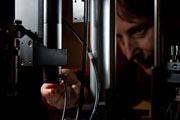 University of Rochester Optics and BME professor Jannick Rolland has developed an optical technology that provides unprecedented images under the skin's surface. The aim of the technology is to detect and examine skin lesions to determine whether they are benign or cancerous without having to cut the suspected tumor out of the skin and analyze it in the lab. Instead, the tip of a roughly one-foot-long cylindrical probe is placed in contact with the tissue, and within seconds a clear, high-resolution, 3D image of what lies below the surface emerges.
University of Rochester Optics and BME professor Jannick Rolland has developed an optical technology that provides unprecedented images under the skin's surface. The aim of the technology is to detect and examine skin lesions to determine whether they are benign or cancerous without having to cut the suspected tumor out of the skin and analyze it in the lab. Instead, the tip of a roughly one-foot-long cylindrical probe is placed in contact with the tissue, and within seconds a clear, high-resolution, 3D image of what lies below the surface emerges.
Researchers Unzip MRSA and Discover Route for Vaccine
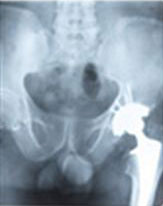 University of Rochester Medical Center orthopaedic scientists are a step closer to developing a vaccine to prevent life-threatening methicillin-resistant staphylococcus aureus (MRSA) infections following bone and joint surgery.
University of Rochester Medical Center orthopaedic scientists are a step closer to developing a vaccine to prevent life-threatening methicillin-resistant staphylococcus aureus (MRSA) infections following bone and joint surgery.
Researchers Investigate Why a Limited Number of White Blood Cells Are Attracted to Injured Tissue
As any weekend warrior knows, an errant elbow or a missed ball can put a crimp in an afternoon of fun. The bruising and swelling are painfully obvious, but the processes occurring under the skin remain full of mystery. What is known is that leukocytes, or white blood cells, mobilize to protect injured body tissue from infection. What is not understood is why some leukocytes - but not others - are attracted to damaged tissue.
